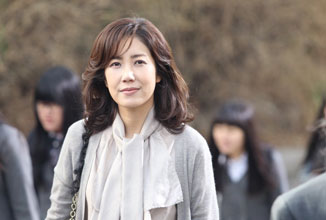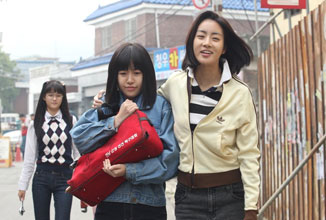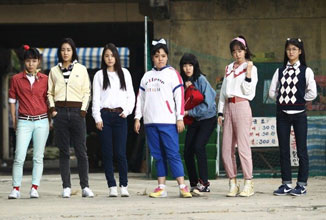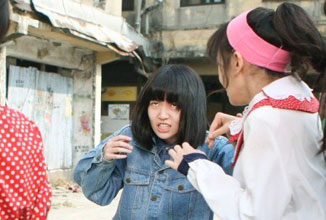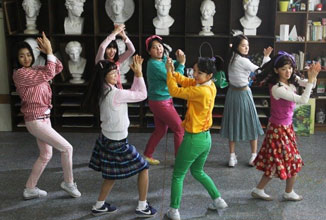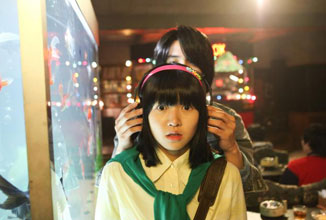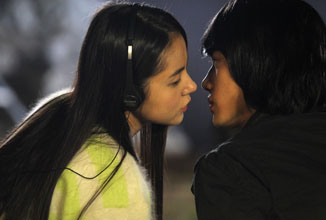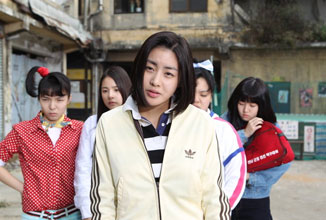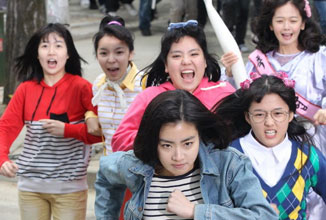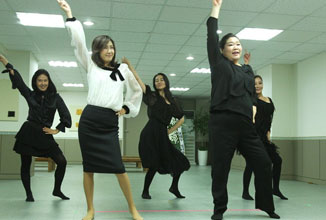
 |
||||||||||||||
Na-mi (Yoo Ho-jeong) is a middle-aged housewife and mother who outwardly seems to have everything she could wish for, but increasingly she feels that something is missing from her life... she just doesn't know what. On visiting her mother in hospital, Na-mi is reacquainted with Chun-hwa (Jin Hee-kyung), a high school friend from many years earlier, who has been admitted with terminal cancer.
Review:
The humour in Sunny is wisely kept, for the most part, to scenes featuring the main characters in their youth: Routinely truly funny (almost to a laugh-out-loud level, in several instances) as well as, equally importantly, being genuinely unpredictable, these frequent moments - Na-mi’s repeated luminous blushing; her inability to refrain from violently shaking when she’s nervous; her sweet and frail grandmother’s incessant foul-mouthed cursing; and the incredible choreography of fight scenes featuring Geum-ok (Nam Bo-ra), the “bookworm with a stick”, for example - also serve to provide a balance and contrast to the poignancy of scenes of the main characters’ present-day lives, and deftly accent the dreams and optimism of youth being replaced with responsibilities, frustrations and unforeseen life-shattering events. However, don’t be misled into thinking that this is just another funny film with a weepy, melodramatic ending tacked on, for though there is a genuine sadness in the latter scenes, is so gently and perfectly handled as to be every bit as uplifting as it is funny while repeatedly touching the heart. In fact, it has to be said that the sadder parts of the story are a great deal more moving as a result of the (obviously conscious) decision not to over-emphasize the melodramatic aspects inherent to them. In short, Sunny takes a fairly familiar narrative arc and breathes life into it at every turn, ultimately reminding us that, regardless of our age, the optimism and love of life felt in youth is never lost, just sometimes misplaced.
While some of the social and cultural (including pop culture) references within Sunny are specifically Korean or, at the very least, more Asian than Western (for example: The rival group of girls being called Girls' Generation; references to, and scenes set in the midst of, the Gwang-ju uprising; and even joking mention of spirit possession, prevalent in a plethora of Asian horror films), for the large part they are fairly easily understood and even though some have rather serious underlying subjects, either politically or within the context of society - such as a fight scene between Sunny and Girls' Generation during the aforementioned Gwang-ju related riots - director Kang Hyeong-cheol expertly manages to keep the humour present within each situation, without ever belittling the underlying real world events, by constantly focusing on the girls' perceptions and on what is important to them in their ongoing struggles (and why), and so invested in the characters do we become, that our focus cannot help but mirror theirs.
The way in which director Kang Hyeong-cheol manages to successfully blend humour and moving drama within a film which features such a large number of main cast members - making each character an engaging individual with believable and memorable eccentricities and, above all, ensuring that viewers like and ultimately care about each and every one of them - while keeping proceedings almost perfectly paced throughout, is frankly staggering, but successfully achieve it he does, to the nth degree, and if anyone reading this review is wondering how a film with such a seemingly clichéd storyline managed to become one of the highest grossing Korean films of all time, I hope I've gone some way towards providing an explanation. I first saw Sunny at the London Korean Film Festival 2011, and my seat was next to a couple of Korean girls. As the narrative progressed, I have to admit to being rather moved by the unfolding storyline and that fact must have been fairly obvious to anyone who cared to look. About half way through the film, one of the Korean girls turned to me, smiled, bowed and said "It's ok to cry", and in the case of Sunny, she was absolutely right.
Directed by: Kang Hyeong-cheol This review of Sunny comes following a screening of the film at the London Korean Film Festival 2011. I'd sincerely like to thank everyone involved in the organisation of the festival for allowing me to see this film, as well as many others throughout the LKFF. |
||||||||||||||
All images © CJ Entertainment, Toilet Pictures and Aloha Pictures Review © Paul Quinn |
||||||||||||||
